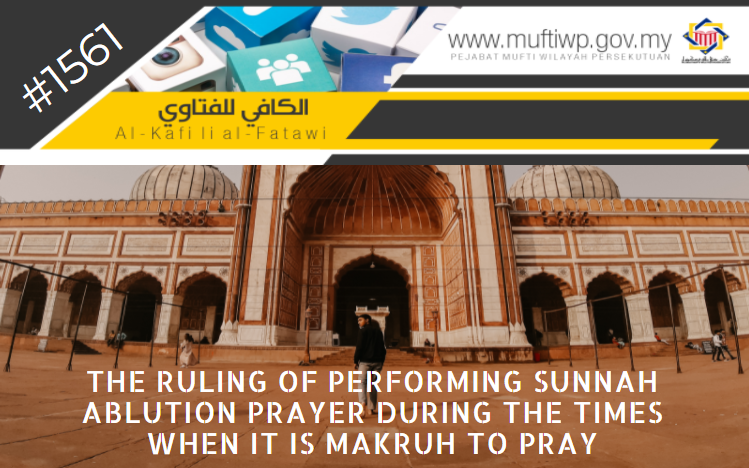
Question:
Assalamualaikum ustaz, what is the ruling for a person who performs the sunnah ablution prayer during the time when it is makruh (undesirable) to pray?
Answer:
Waalaikumussalam wbt,
Alhamdulillah, praise and thanks to Allah for the countless blessings He has blessed us all with. Blessings and salutations to the Prophet Muhammad PBUH, his wives, his family, companions and all those that follow his teachings to the day of judgement.
Sunnah ablution prayer is one of the sunnah prayers sanctioned and tsabit according to syarak. This is according to a hadith narrated by ‘Utsman bin ‘Affan, where he said the Prophet PBUH said:
مَنْ تَوَضَّأَ وُضُوئِي هَذَا، ثُمَّ يُصَلِّي رَكْعَتَيْنِ، لاَ يُحَدِّثُ نَفْسَهُ فِيهِمَا بِشَىْءٍ، إِلاَّ غُفِرَ لَهُ مَا تَقَدَّمَ مِنْ ذَنْبِهِ
“Whoever performs ablution like my present ablution and then offers two rak`at in which he does not think of worldly things, all his previous sins will be forgiven.”
Sahih al-Bukhari (1934)
Imam al-Ramli argued using the above hadith in explaining the sanctioning of the sunnah ablution prayer saying: Two rakaat is sunnah for ablution by which the person prays two rakaat after his ablution with the intention of sunnah prayer. Refer Syarah Zubad, Al-Ramli (pg. 48).
While regarding the issue of times when it is makruh to pray, Syeikh Taqiyuddin al-Hisni stated these times are:
- After subuh prayer until the sun rises.
- When the sun rises completely up to the length of a spear.
- After asar until the sun sets.
- When the sun sets until it has set completely.
Refer Kifayah Al-Akhyar, Taqiyuddin Al-Hisni (pg. 126)
Coming back to the question presented, we share the statement of Imam al-Nawawi who said:
النَّهْيُ وَالْكَرَاهَةُ فِي هَذِهِ الْأَوْقَاتِ، إِنَّمَا هُوَ فِي صَلَاةٍ لَيْسَ لَهَا سَبَبٌ، فَأَمَّا مَا لَهَا سَبَبٌ فَلَا كَرَاهَةَ
The restriction and makruh (undesirable) ruling in these times is only for prayers without a reason, while for prayers with their own reason, then it is not makruh (undesirable) [for it is to be performed during these specific times]
Refer Raudhah Al-Thalibin, Al-Nawawi (1/192)
Subsequently, in another statement of Imam al-Nawawi, he stated several examples of prayers with a reason:
فَمِنْ ذَوَاتِ الْأَسْبَابِ الْفَائِتَةُ فَرِيضَةً كَانَتْ أَوْ نَافِلَةً إذَا قُلْنَا بِالْأَصَحِّ أَنَّهُ يُسَنُّ قَضَاءُ النَّوَافِلِ فَلَهُ فِي هَذِهِ الْأَوْقَاتِ قَضَاءُ الْفَرَائِضِ وَالنَّوَافِلِ الرَّاتِبَةِ وَغَيْرِهَا وَقَضَاءُ نَافِلَةٍ اتَّخَذَهَا وِرْدًا وَلَهُ فِعْلُ الْمَنْذُورَةِ وَصَلَاةُ الْجِنَازَةِ وَسُجُودُ التِّلَاوَةِ وَالشُّكْرِ وَصَلَاةُ الْكُسُوفِ وَصَلَاةُ الطَّوَافِ
Among the prayers with a reason is missed prayers, whether it is obligatory or sunnah prayers when we state the sahih opinion which states it is sunnah to replace nafilah (Sunnah) prayers which are missed, then it is permissible for a person to qadha’ missed obligatory and sunnah rawatib prayers during these times of which they had make it (sunnah rawatib prayer) their usual or common prayers. And it is also permissible for a person to perform nazar and janazah prayers, the prostration of gratitude and tilawah, as well as sunnah eclipse and tawaf prayers.
The dalil (evidence) which states that it is permissible to perform these prayers with a reason during the times when it is restricted to pray is in accordance with a hadith narrated by Qais bin ‘Amr, where he said:
رَأَى رَسُولُ اللَّهِ صلى الله عليه وسلم رَجُلاً يُصَلِّي بَعْدَ صَلاَةِ الصُّبْحِ رَكْعَتَيْنِ فَقَالَ رَسُولُ اللَّهِ صلى الله عليه وسلم صَلاَةُ الصُّبْحِ رَكْعَتَانِ فَقَالَ الرَّجُلُ إِنِّي لَمْ أَكُنْ صَلَّيْتُ الرَّكْعَتَيْنِ اللَّتَيْنِ قَبْلَهُمَا فَصَلَّيْتُهُمَا الآنَ فَسَكَتَ رَسُولُ اللَّهِ صلى الله عليه وسلم
“The Messenger of Allah (ﷺ) saw a person praying after the congregational prayer at dawn was over. The Messenger of Allah (ﷺ) said: There are two rak'ahs of the dawn prayer (i.e. the prescribed rak'ahs). The man replied: I did not pray the two rak'ahs before the dawn prayer. Hence, I offered them now. The Messenger of Allah (ﷺ) kept silent.”
Sunan Abu Daud (1267)
Thus, the silence of the Prophet PBUH explains that he did not restrict the Companion from performing sunnah prayer with a reason after the obligatory subuh prayer.
Regarding the issue of performing sunnah ablution prayer during the restricted times to pray, Imam al-Nawawi mentioned the issue stating:
وَلَوْ تَوَضَّأَ فِي هَذِهِ الْأَوْقَاتِ فَلَهُ أَنْ يُصَلِّيَ رَكْعَتَيْ الْوُضُوءِ صَرَّحَ بِهِ جَمَاعَةٌ مِنْ أَصْحَابِنَا
If a person performs his ablution during the makruh (undesirable) times, then it is permissible for him to perform two rakaat sunnah ablution prayer as clearly stated from our ashab.
Refer Al-Majmu’, Al-Nawawi (4/170)
However, it should be explained that this sunnah ablution prayer will only be the outcome if a person performs an obligatory or other sunnah prayer of two or more rakaat. Imam al-Ramli said: “And this two rakaat (sunnah ablution prayer) is a result of an obligatory or other sunnah prayer of two rakaat or more the same as two rakaat of tahiyyatul masjid prayer.” Refer Syarah Zubad, Al-Ramli (pg. 48).
Conclusion
To conclude, we would like to state that it is permissible to perform the sunnah ablution prayer during the times it is makruh (undesirable) to pray. The reason is sunnah ablution prayer is not categorized as mutlak (absolute) sunnah prayer or sunnah prayer without a reason. Consequently, it is categorized as sunnah prayer with a reason.
Lastly, we pray to Allah SWT to be given the correct understanding in religion. Amin.

